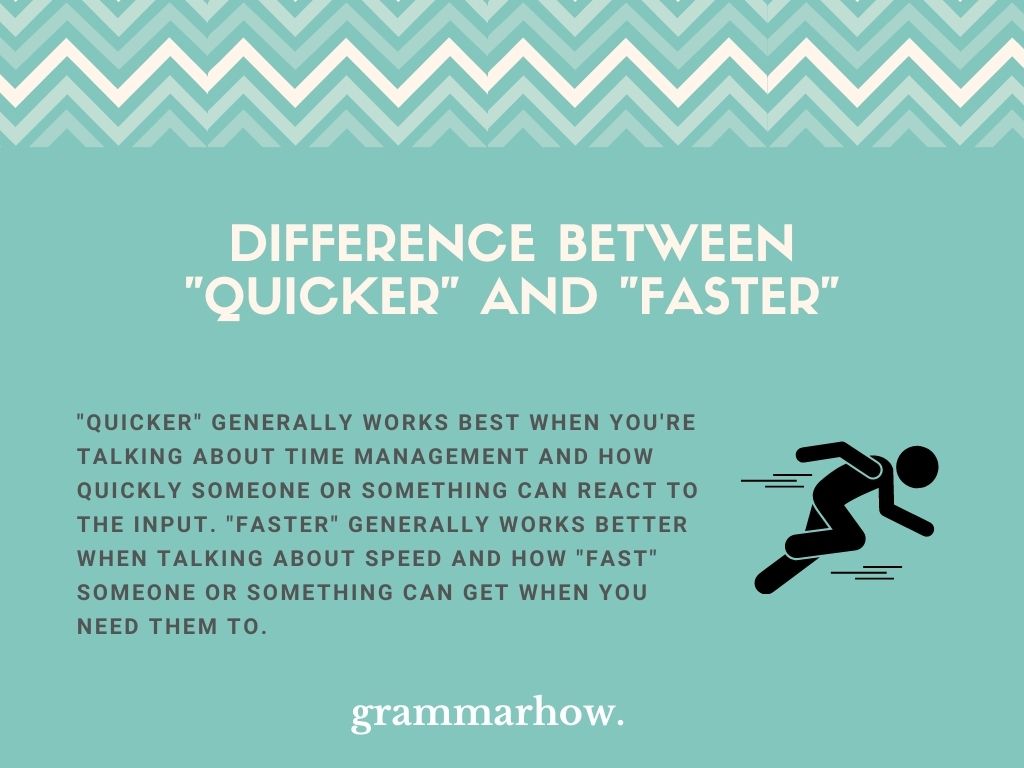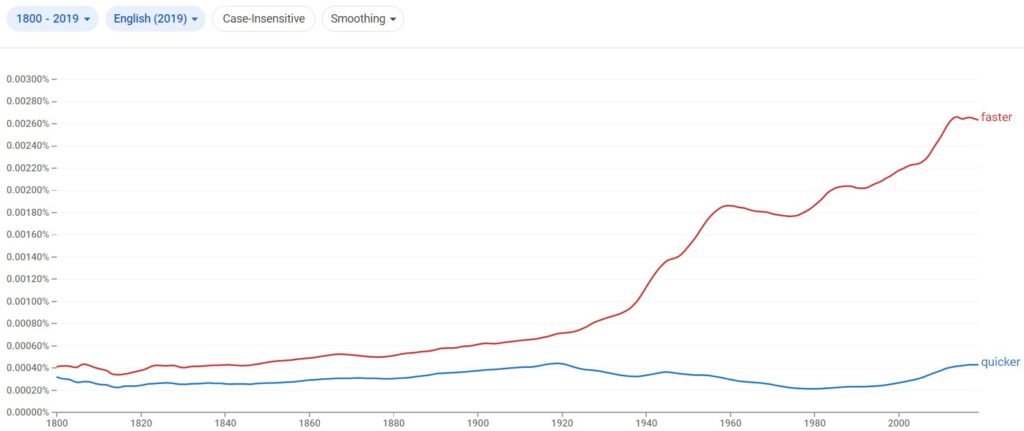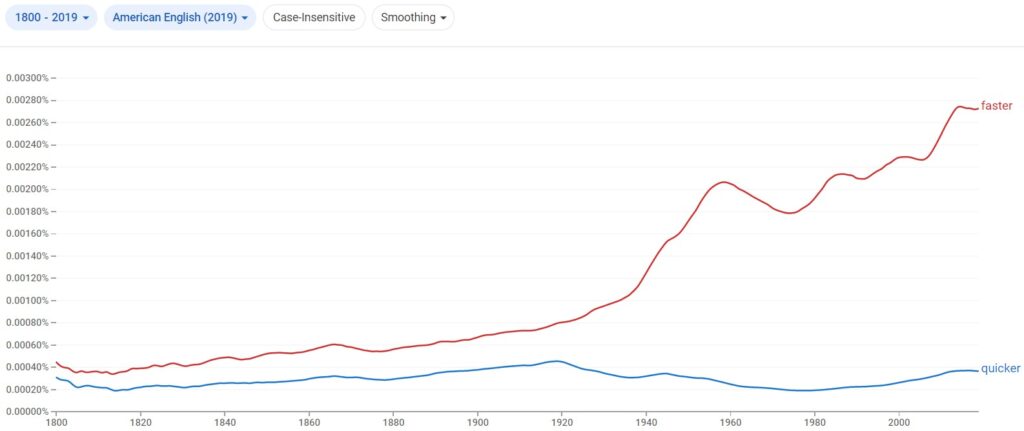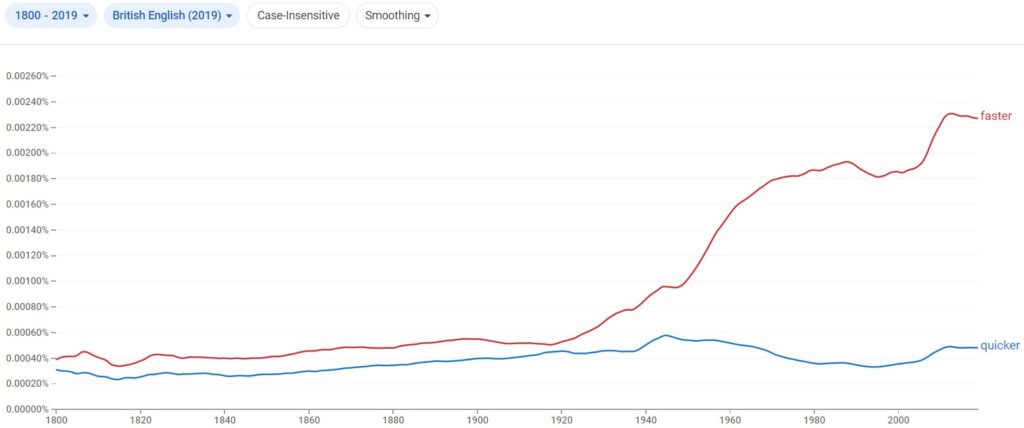“Quicker” and “faster” are very similar words. It’s no secret, and everyone seems to know about them. However, are there any differences that we need to know about? This article will explore whether they have different meanings, even if they look similar.
What Is The Difference Between “Quicker” And “Faster”?
“Quicker” generally works best when you’re talking about time management and how quickly someone or something can react to the input. “Faster” generally works better when talking about speed and how “fast” someone or something can get when you need them to.

The difference is very small, and many people will use them synonymously. For example, there is nothing wrong with the following:
- I will get there quicker than you.
- I will get there faster than you.
However, it’s common for native speakers to look for more suitable ways to identify similar words. Therefore, native speakers will put contextual meanings into words that the general population might not otherwise notice.
The following examples are more related to the contextual definitions:
- Time: He reacted quicker than I expected him to.
- Speed: You ran faster than me in that race.
What Does “Quicker” Mean?
Now, let’s go over the meanings of the two words a little closer. This might help you to clear up any confusion.
“Quicker” means that something is happening at a great speed. We can use it to refer to people or things, and it’s a comparative adjective that allows us to compare two people or things and how they are reacting.
The definition of “quicker,” according to The Cambridge Dictionary, is “happening or done with great speed, or lasting only a short time.”
While there is no specific mention of reaction or timing in the dictionary definition, it is still common for native speakers to use the comparative adjective to measure time.
Examples Of How To Use “Quicker” In A Sentence
These examples should help you to learn more about “quicker:”
- I would like to do this quicker, but I don’t know what I need to do to get that to happen.
- Whatever you do, you’ve got to be quicker next time! Otherwise, you’re bound to fail.
- This machine is much quicker than I realized, and it solved the problem in no time.
- We have found it to be quicker if we all put our minds together to come to a solution.
- This isn’t quicker, and we need to come up with a better way to solve the problem before it’s too late.
- Would you like to be quicker? I think I know of a few tips that might help you.
- If you’re trying to be quicker, you should practice! It’s the only way to get it to work.
“Quicker” works best in reference to timing rather than speed. We can use it mostly to talk about machines or reaction times of people.
What Does “Faster” Mean?
“Faster” is almost identical to “quicker.” Since the only real differences come from context, you might find this section helpful.
“Faster” means that someone or something is moving or happening quickly. We can use it to show that something can move at great speeds, and it’s much more common for us to use “faster” to compare the speeds of two things.
The definition of “faster,” according to The Cambridge Dictionary, is “moving or happening quickly, or able to move or happen quickly.”
We would typically use “faster” more to compare people or machines in races. We might also find it useful when someone is trying to move as fast as they can, and it’s a really good way to show that speed is an important factor in the context.
Examples Of How To Use “Faster” In A Sentence
Here are a few examples that should help you:
- I’ll need to run much faster if I want to get in line for the podium tomorrow.
- You’ll have to be faster than that! You’re not even allowing me to break a sweat.
- I thought you were faster than him! You haven’t done very well to prove it.
- I’m not going to get much faster without practice! That’s why I train all the time.
- If you’re looking to get faster, maybe you should try getting a coach. The one I have has helped me a bunch!
- You’ll be faster than him when you have a few more years on your side! Trust me!
- That car was so much faster than I thought it was going to be! I was shocked when it blasted off the line!
“Faster” generally refers more to speed, which is why it’s the more competitive choice (and the examples show that).
Is “Quicker” Or “Faster” Used The Most?
Some of the following statistics might help you to understand which is more common.
According to Google Ngram Viewer, “faster” is by far the most popular choice of the two comparative adjectives. That’s because it’s much more likely for us to use the adjectives in reference to speed rather than timing or reactions.

You might also notice that “faster” has always been the more popular choice. Even over the last two centuries (which the graph covers), there has never been a point where “quicker” managed to be more popular.
Is “Quicker” And “Faster” Used Differently In American English And British English?
What happens to those statistics if we look into American and British English rules? If nothing changes, then it’s a good sign that “faster” is the more useful adjective to us.
According to Google Ngram Viewer, “faster” is the most popular adjective in American English when compared with “quicker.”

According to Google Ngram Viewer, “faster” is also the most popular choice in British English.

Both of these graphs show that “faster” is the more likely choice to come across. It’s always better to use the adjective to refer to speed, which is why it’s so common to see it written above “quicker.”
“Quicker” And “Faster” – Synonyms
Finally, let’s check out a few synonyms that can replace both words:
- Swifter
- More rapid
- Brisker
- Nimbler
- Promptly
- Hastily
You may also like:
“Quicker” Or “More Quickly” – Difference Explained
Fairly Quick or Fairly Quickly – Which Is Correct?

Martin holds a Master’s degree in Finance and International Business. He has six years of experience in professional communication with clients, executives, and colleagues. Furthermore, he has teaching experience from Aarhus University. Martin has been featured as an expert in communication and teaching on Forbes and Shopify. Read more about Martin here.
